
Ships of international shipping firms unload cargo at the Cebu International Port in this February 2016 photo (CDN FILE PHOTO).
Three business groups in Cebu are calling for the regulation of container imbalance and port congestion subcharges imposed by international shipping lines that use the Cebu International Port as port of discharge.
In a joint manifesto, the Cebu Chamber of Commerce and Industry (CCCI), Philippine International Seafreight Forwarders Association, Inc. (Pisfa) Cebu, and the Chamber of Customs Brokers, Inc. (CCBI) Cebu requested President Duterte to designate the Department of Trade and Industry (DTI) to oversee, review and regulate these shipping firms’ operations.
“The Cebu business community . . . in line with the 10-point Economic Agenda of . . . (the) President . . . of increasing competitiveness and the ease of doing business, among others, hereby brings to the attention of the government the perennial practice of international shipping lines of imposing charges in addition to the regular freight on import and export cargoes even though our Cebu International Port is not experiencing congestion,” the manifesto read.
The manifesto was signed by CCCI President Melanie Ng, Pisfa President Carmel de Pio-Salvador and CCBI President Jose Jefferson Bajao, copies of which were furnished to DTI Secretary Ramon Lopez, Presidential Assistant for the Visayas Michael Dino and the Philippine Chamber of Commerce and Industry through the Visayas Area Business Conference in Ormoc City last week.
CIC, PCC
According to the three business groups, the container imbalance charge (CIC) and the port congestion charge (PCC) imposed by international shipping firms are only based on perception and without consideration of the impact to consumers who, in the end, bear the increase in prices of commodities passed on to them by businessmen.
The CIC is meant to offset shipping lines’ costs of transferring empty containers from one place to another, only applicable during certain seasons when there is a large gap between import and export activities.
On the other hand, the PCC is applied by shipping lines to cover losses caused by congestion and idle time for vessels serving a certain port. Shipping lines have the right to impose this surcharge on the freight to recover revenue losses.
FPI data
Data from the Federation of Philippine Industries (FPI), which also questioned these charges imposed by shipping lines last year, showed that charges in the country are much higher compared to those in other Asian countries.
Average shipping line local charges in Cebu and Davao ports were at P26,426 and P22,053, respectively, as of 2015 while charges in Manila port stood at P27,159.
However, average shipping line local charges are estimated to be much lower in other Asian countries such as Bangladesh (P1,406.74), Indonesia (P4,737.89), Malaysia (P5,634.10), Singapore (P10,952.70), Thailand (P9,288) and Japan (P12,540).
“Based on the report of the import and export industries, there have been container deposits left unreturned by a number of international shipping lines to the rightful importers for at most two to three months,” the joint manifesto stated.
The manifesto further said that only a few international shipping lines have consistently been returning container deposits to rightful importers and exports imme diately upon the return of these containers accordingly.
CCCI, Pisfa and CCBI recognized that the Cebu International Port plays an important role in the movement of goods and economic improvement of Visayas and Mindanao.
However, the three groups added that the charges imposed by international shipping firms would “diversely affect the regions’ competitiveness and connectivity” with Asean neighbors.
“The desire of the Cebu Business Organizations to become more competitive would only be achieved if government has full oversight of the international shipping lines operations using the Cebu International Port as their port of discharge,” the manifesto said.
Escalona, Dino
Federico Escalona, executive director of the Philippine Exporters Conferedation, Inc. (Philexport) Cebu, said that he wasn’t aware of this initiative.
He said that these charges had already been regulated by the CPA Commission, chaired by the country’s transportation secretary and by the Association of International Shipping Lines, which operates under an antitrust policy.
Presidential Assistant to the Visayas Michael Dino, who had yet to receive a copy of the manifesto, said he would still have to study the document.
But he said he would also meet with stakeholders to discuss the issue to get to the bottom of the problem.
He added that his office would also tap experts to find solutions.